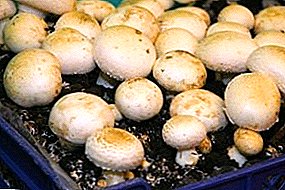 Pigeon meat - tender, juicy, dietary and very healthy. In ancient times, it was one of the favorite delicacies of kings and emperors. Today, meat pigeon in Russia is not too common and is a fairly promising industry for business. In this article we will look at the most popular breeds of meat pigeons, and if you suddenly decide to start breeding such a bird, then you will know which breed to pay attention to.
Pigeon meat - tender, juicy, dietary and very healthy. In ancient times, it was one of the favorite delicacies of kings and emperors. Today, meat pigeon in Russia is not too common and is a fairly promising industry for business. In this article we will look at the most popular breeds of meat pigeons, and if you suddenly decide to start breeding such a bird, then you will know which breed to pay attention to.
King
 This breed was bred in 1890 in the United States, by breeding. Kinga grown for meat production, as well as shows at trade shows. The weight of a pigeon is from 700 g to 1, 5 kg. In appearance, these pigeons are very similar to chickens. They have a powerful body, short thick neck and a large smooth head. White birds with black eyes, colored - with yellow. Thin eyelids - beige or red color, beak - powerful, medium size. The chest part is round, wide, convex. Wings - short, tightly pressed to the body. Feet - no feathers, medium size. Tail - small, raised to the top. Feathers - coarse, fit snugly to the body. Kinga can be white or variegated when among white feathers there are yellow, gray, red.
This breed was bred in 1890 in the United States, by breeding. Kinga grown for meat production, as well as shows at trade shows. The weight of a pigeon is from 700 g to 1, 5 kg. In appearance, these pigeons are very similar to chickens. They have a powerful body, short thick neck and a large smooth head. White birds with black eyes, colored - with yellow. Thin eyelids - beige or red color, beak - powerful, medium size. The chest part is round, wide, convex. Wings - short, tightly pressed to the body. Feet - no feathers, medium size. Tail - small, raised to the top. Feathers - coarse, fit snugly to the body. Kinga can be white or variegated when among white feathers there are yellow, gray, red.
Did you know? To improve performance, males are recommended to cross with sports doves, which are characterized by an increased level of fertility. Nestlings from such a pair will be more fleshy.
Kinga in pigeon breeding are very popular: they grow quickly, have thin skin, fleshy, lead a lot of chicks and take good care of them. In one year, with proper care, you can get about 16 chicks from them. The most delicious, tender and dietary meat in young animals. Therefore, pigeons for meat production usually feed up to 45 days. At this age, one individual in weight reaches about 750-800 g.
Important! Kings do not fly. Because of this, their nests need to be placed on the floor or not very high from it.
Carnot
Carnot derived in France. These are medium-sized pigeons: their weight reaches from 500 to 700 g. They grow rapidly and breed well. They differ excessively convex thoracic and disproportionately small head size. Their neck is short, thick, and their beak is long, pink, slightly curved. Feet without feathers, short. The tail is short and lowered to the floor. Feathers - thick, wide. They can be monochromatic (brown, white, black) and variegated (white with gray, red feathers, or brown with white feathers). Carnot suitable for captive cultivation. Actually, this breed was bred to reduce the cost of caring for pigeons and reduce the cost of pigeon meat.
Monden
 Pigeons of Monden come from France. Their name received from the name of the city of Mont-de-Marsan, in which they were grown for the first time. These are very fleshy and prolific birds. Monthly Monden in weight reaches 500 g, and an adult up to 1, 2 kg. These pigeons can also be grown as ornamental. Representatives of the breed are distinguished by a powerful body, a wide convex thoracic region, a small head, a short thick neck, which is almost imperceptible. The bill is average and reaches 0.3 cm. Eyes - small, brown. Wings - small, tightly pressed to the body and barely stand out. Feathers have a beautiful silver color. Legs - short, dark red, almost black. The tail is raised to the top.
Pigeons of Monden come from France. Their name received from the name of the city of Mont-de-Marsan, in which they were grown for the first time. These are very fleshy and prolific birds. Monthly Monden in weight reaches 500 g, and an adult up to 1, 2 kg. These pigeons can also be grown as ornamental. Representatives of the breed are distinguished by a powerful body, a wide convex thoracic region, a small head, a short thick neck, which is almost imperceptible. The bill is average and reaches 0.3 cm. Eyes - small, brown. Wings - small, tightly pressed to the body and barely stand out. Feathers have a beautiful silver color. Legs - short, dark red, almost black. The tail is raised to the top.
Did you know? The pigeons of Monden are among the most resistant to diseases, growing rapidly and gaining weight. This breed is often used to cross and produce highly productive hybrids.
Roman
Roman pigeons come from Italy. This is one of the oldest breeds, it is often used for breeding large fleshy breeds of pigeons. Roman pigeons are distinguished by a large oblong body, thick plumage, and a long tail. They have very beautiful dense wings. The head is smooth, large in size with a high forehead. Long beak, slightly curved. Birds of white color are dark, in color - white. Eyelids red or dark brown.
Doves of this breed have a very wide thoracic region and back. The neck is thick and short, stands out well. Paws - small, without feathers, red. Wings - long, adjacent to the tail. Unlike previous species, Roman birds have a long, wide tail with a rounded end. Pigeons have a charming gray, bluish color with vertical stripes of black on the wings and tail. There are beige with brown or gray stripes on the tail and wings, as well as black birds with bright dots on the head.
Important! Pigeons of this breed do not hatch many chicks. Therefore, for good performance, it is recommended to cross them with the Kings or Mondens.
Roman birds are large and fleshy. The mass of an adult pigeon reaches from 1, 2 to 2 kg. Their big advantage is also resistance to diseases. They have a pretty pugnacious temperament.
Strasser
 There are several versions as to where this breed was bred and from which pigeons. Some believe that the birthplace of birds is Germany, and the breeds from which they were bred are gray, Florentine pigeons and Mondena. Others claim that the birds were bred in Austria from Modena and the Florentines or in Moravia. Allocate German and Czech Strassers. German larger - up to 1, 2 kg, Czech - up to 700 g. Torso and head are large, bulging forehead. The beak is medium size, powerful. Eyes of an orange shade, eyelids long and narrow. The neck is not long, thick, slightly arched. Breast - wide, convex.
There are several versions as to where this breed was bred and from which pigeons. Some believe that the birthplace of birds is Germany, and the breeds from which they were bred are gray, Florentine pigeons and Mondena. Others claim that the birds were bred in Austria from Modena and the Florentines or in Moravia. Allocate German and Czech Strassers. German larger - up to 1, 2 kg, Czech - up to 700 g. Torso and head are large, bulging forehead. The beak is medium size, powerful. Eyes of an orange shade, eyelids long and narrow. The neck is not long, thick, slightly arched. Breast - wide, convex.
The wings of the Strassers are small, but wide. Paws are strong, medium long, red in color. Tail - narrow, medium size. These pigeons are distinguished by an interesting color of feathers: the lower part of the body and chest is white, and the head, neck, and tail are colored. There are also gray-eyed individuals with black stripes on the tail or birds with red, rich black feathers and a white “scarf” on the neck. This breed is valuable for its fertility, in one year you can breed about 12 chicks.
Important! Strassers are not recommended to cross with other breeds. Pigeons over five years old are not suitable for breeding.
Teksan
 Texan withdrawn in America, growing rapidly and gaining weight. Calm, well adapted to the external habitat. Adult bird in weight reaches 1 kg. Texan, in a sense, unique pigeons, their color can clearly determine the sex, and the sex of the chick can be calculated immediately after he hatch. The males have a light beak and a very short down, the females have a long yellow fluff, and a brown or dark pink stain forms on the beak after a couple of days. Adult males have a white color of feathers with a brown or golden shade on the neck and thoracic region or completely white with colored spots in the chest area. In females, the wings have a beige or brown color, the thoracic region is gray or blue.
Texan withdrawn in America, growing rapidly and gaining weight. Calm, well adapted to the external habitat. Adult bird in weight reaches 1 kg. Texan, in a sense, unique pigeons, their color can clearly determine the sex, and the sex of the chick can be calculated immediately after he hatch. The males have a light beak and a very short down, the females have a long yellow fluff, and a brown or dark pink stain forms on the beak after a couple of days. Adult males have a white color of feathers with a brown or golden shade on the neck and thoracic region or completely white with colored spots in the chest area. In females, the wings have a beige or brown color, the thoracic region is gray or blue.
Did you know? This breed is considered one of the most prolific. About 24 chicks can be bred a year.
The Texans breast is powerful, wide, slightly raised. The head is medium sized and smooth. Males have gray or pink eyes, females have orange. Torso - fleshy, powerful. Legs - short, light. Texans can fly, but they do it very rarely.
Prahensky Canik
Czech breed of pigeons, very old. The weight of pigeons is average, about 750 g. Fruited, disease resistant. The breed was bred from Domestic, Florentine, Viennese chicken pigeons and Czech Chibis. Pigeons grow quickly and gain weight. Unlike other broiler pigeons, they fly very well. Their bodies are small and graceful. The beak is orange-red. The chest is broad, convex, the wings are well developed. The neck is medium sized. The eyes are orange. Paws are medium in size, without feathers. The tail continues the line of the back.
Polish lynx
 The Polish Lynx breed is very popular and such pigeons are great for the purpose of growing for food. The mass of an adult bird reaches 800 g, and about 8 chicks are bred per year. Birds have a calm character, they know how to fly. Breast - wide, convex. The back is short. The head is round, large in size. Beak - light and long. The neck is thick, short, does not stand out. Eyes - orange, narrow eyelids. The legs of the representative of the breed - medium length, widely spaced. Tail - narrow, collected, located at the level of the back. Most often, monochrome birds are found: black, white, gray, brown, blue. There are also various patterns: stripes or specks of a different color on the tail, wings, neck.
The Polish Lynx breed is very popular and such pigeons are great for the purpose of growing for food. The mass of an adult bird reaches 800 g, and about 8 chicks are bred per year. Birds have a calm character, they know how to fly. Breast - wide, convex. The back is short. The head is round, large in size. Beak - light and long. The neck is thick, short, does not stand out. Eyes - orange, narrow eyelids. The legs of the representative of the breed - medium length, widely spaced. Tail - narrow, collected, located at the level of the back. Most often, monochrome birds are found: black, white, gray, brown, blue. There are also various patterns: stripes or specks of a different color on the tail, wings, neck.
Important! The meat of the Polish lynx is distinguished by its high taste, but it is not recommended to cross the pigeons of this breed with other species in order not to lose its quality characteristics.
These breeds of pigeons are most suitable for industrial purposes. Their meat has excellent taste, they are not whimsical in care, grow quickly and multiply.












